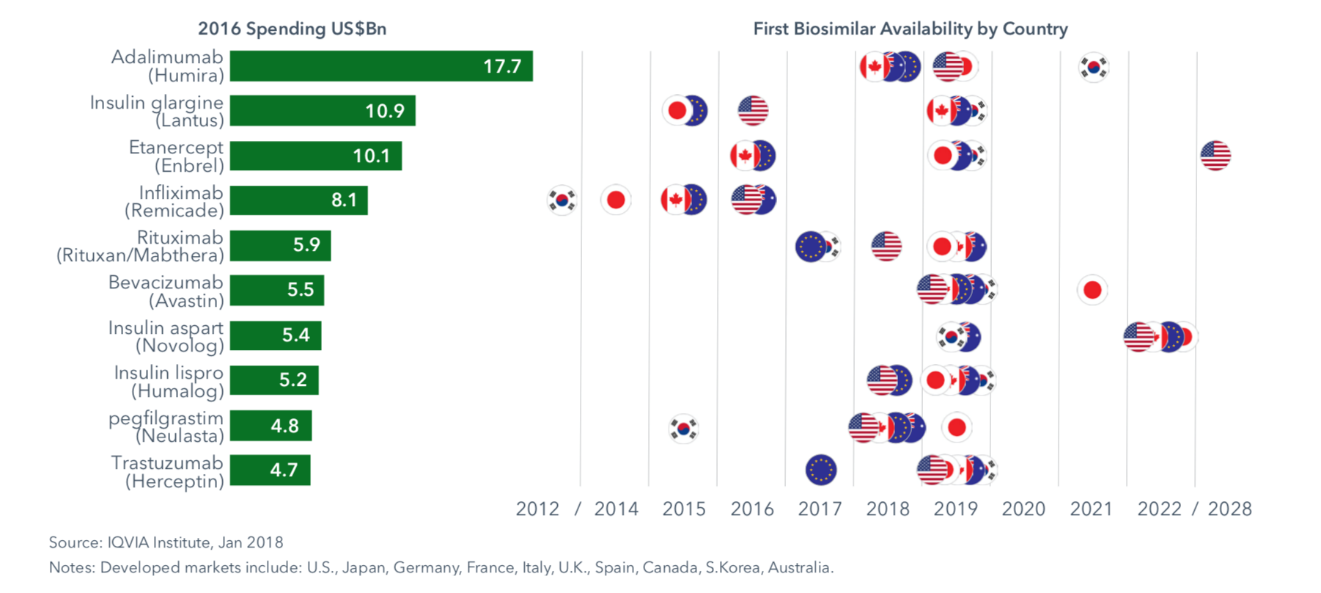Uncategorized Thursday, 2019/01/10
In general, biosimilars are generic products of biopharmaceuticals. Different from generics, they are “similar” and therefore require approval procedures similar to new branded drugs.
Although there are about 25 approved biosimilars in Europe, they did not receive the same treatment in the United States. Despite 11 drugs are approved in the United States, only about 3 kinds can be utilized in patients for branded pharmaceutical companies are using commercial strategies to prevent biosimilar drugs from competing for their current high-priced biopharmaceuticals.
The US FDA launched a biosimilar drug action plan in July 2018 to encourage the development of biosimilar drugs. FDA Director Scott Gottlieb said, “Only less than 2% of Americans use biologics, but biologics account for 40% of total prescription drug expenditures and 70% of drug spending growth in 2010-2015.”
He also complained that “the competition for biosimilars is weak, because the entire supply chain, including manufacturers, pharmacy welfare management, group purchasing organizations, and distributors, is more inclined to split monopoly profits by obtaining generous rebates from original biologics, instead of accepting competition of biosimilars and their lower prices."
Although the FDA is trying to encourage the development and application of biosimilar products in the United States, there seems to be a trend that large pharmaceutical companies are no longer keen to produce biosimilar products. In its regulatory focus commentary, the American Society for Healthcare Regulatory Affairs (RAPS) pointed out that in the past month, three companies “extended to withdraw from the field of biosimilars in some way”.
For the FDA required for more information, Sandoz from the non-patent drug division of Novartis, stopped the registration of the biosimilar drug rituximab. Stefan Hendriks, director of global biopharmaceuticals at Sandoz, said: "The market for rituximab will be met before we can generate the required data." He may refer to the fact that Celltrion and Teva Pharmaceutical's rituximab biosimilar products have been approved. Pfizer will also obtain approval decisions for rituximab's biosimilar products in the second quarter of next year.
RAPS also reported that "Berlinger Ingelheim is still suing with the original drug company Aibowei for its approval of Humira (adalimumab) biosimilar products in the United States. The former also said that it will abandon the development of all biosimilar drugs outside the United States. And will not commercialize its approved Humira biosimilars in the EU."
Oncobiologics is changing its name to Outlook Therapeutics and has recently stopped developing bevacizumab and adalimumab biosimilars.

Is it a trend or a temporary one to stop the development of biosimilar drugs?
At least one pharmaceutical expert, Sarfaraz Niazi (written in 2014 for the Handbook of Biotherapeutic Proteins) believes this may be a trend. To a large extent, his conclusions are based on the history of generic drugs. “This is a historical re-enactment of the era of generics. There are many ways to reduce R&D costs and manufacturing costs, but they cannot do this because of the thinking and design of big pharmaceutical companies. Of course, both can change, but this requires a huge change."
In essence, most generic pharmaceutical companies have given up on generic drugs when generic prices have plummeted. Pharmaceutical companies have noticed how difficult it is to get biosimilar products to be attractive in the US, how high the cost of development is, and how the original drug manufacturers are persistently fighting against competitors of biosimilar drugs.
Niazi believes that “although biosimilars have great profits, they are not sustainable. Once the price of the original drug is reduced to less than 60% of the current price, it is impossible to make large companies like Amgen and Pfizer stay for a long time in this market."
He also believes that “when pharmaceutical companies from India and China begin to produce biosimilars at much lower cost, this situation will become more complicated. Each monoclonal antibody, regardless of its use, costs about $150-200 per gram. Once the products of Indian and Chinese companies are approved, the price will drop by another 50%; at this stage, the prescriber will become redundant and the payer will take over the market in the future."
The suspension or stagnation of Sandoz, Boehringer Ingelheim, and Oncobiologics are just a few incidents. In 2017, Merck in Germany stripped the bio-imitation business to Fresenius for $195 million. In November, Merck, headquartered in the United States, abandoned the Lantus insulin biosimilar program after assessing expected prices and production costs. Niazi believes that large pharmaceutical companies will give up biosimilar products, but smaller companies will fill the gap. This may be his opinion, because earlier this year he set up a biosimilar development company, Karyo Biologics.
Despite the uncertainty, Merck, Amgen, Pfizer, and Sandoz have all indicated to BioProcess Insider that they are not planning to give up the field of biosimilars. Kelly Davenport, director of public relations at Amgen, said: "Although we can't comment on the company's strategy, there are 10 biosimilar products in our portfolio, and Amgen is still working on biosimilar products."
In the United States, perhaps biosimilars are in a transitional period, with large pharmaceutical companies and small companies competing for limited market resources, which is comparable to generic companies. Not everyone can survive, and not everyone thinks it is worth paying for falling profits or accepting regulatory issues.
But one thing is for sure. If a biopharmaceutical is a big selling brand, the company will target biosimilars. The world's best-selling drug, Humira, is the most competitive biosimilar. Seven companies have reached a lawsuit agreement with Aberdeen and are awaiting the launch of a biosimilar of the drug in the United States in 2023. Boehringer Ingelheim may be the eighth. In Europe, there are already four companies that have listed Humira biosimilars, with discounts of up to 80% in some Nordic markets. Aberdeen CEO Rick Gonzalez said: "This discount is 10 percentage points higher than we expected. The company expects to lose about 25% of Humira sales in Europe and international markets in 2019."
